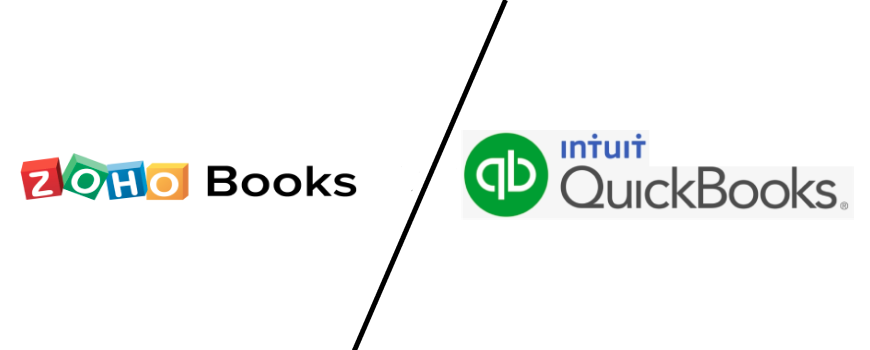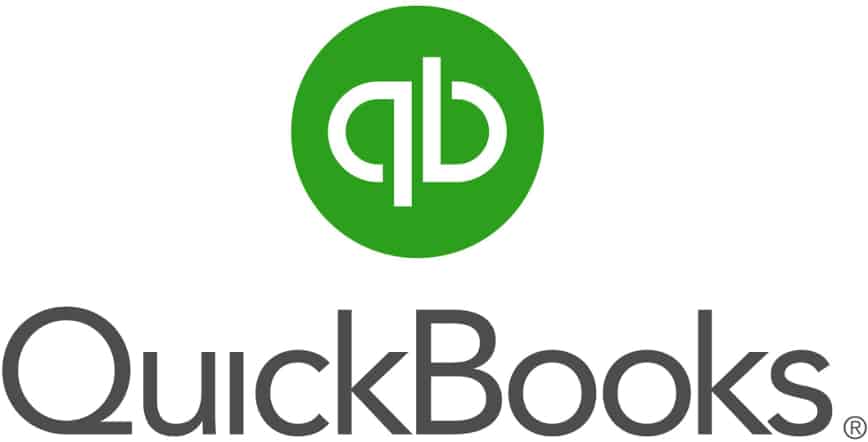Are you set to take responsibility for your organisation’s finances? Look no further, because today we’re going to delve into both sides of Zoho Books vs QuickBooks, two effective programmes that may totally change the way you manage your finances. In the following article, we’ll look at the way Zoho Books vs QuickBooks software solutions can help your financial processes achieve fresh heights of efficiency, accuracy, and control. Whether you’re a fledgling company owner searching for an easy-to-use platform or an accomplished accountant looking for sophisticated features, Zoho Books and QuickBooks are available to assist you!

Introduction: Zoho Books vs QuickBooks
What is Zoho Books?
Zoho Books is a cloud-based accounting solution created by Zoho Corporation, a renowned software supplier best known for its business application package. Zoho Books is aimed to make managing finances easier for small and medium-sized enterprises by providing an array of functions such as bank reconciliation, billing, expense monitoring, stock management, and reporting. Zoho Books provides businesses with an extensive toolset to improve their bookkeeping procedures, pick up knowledge about their financial health, and make smart business decisions, thanks to its intuitive user interface and cheap price levels.
You May Also Compare
Choose what is right for you! Compare Quicken with QuickBooks to keep your business running!
View All FeaturesWhat is QuickBooks?
QuickBooks is a recognised financial management programme created by Intuit. It is famous among entities of all sizes because of its broad range of capabilities and user-friendly layout. QuickBooks provides a number of features, such as management of inventory, invoicing, bank reconciliation, cost tracking, time tracking, and powerful reporting. QuickBooks, thanks to its scalability and broad interfaces with a variety of third-party programmes, offers businesses the versatility and tools they need to handle their money simply and efficiently.
Features: Zoho Books vs QuickBooks

Zoho Books | QuickBooks |
| Invoicing and billing: Generate and distribute professional bills, automate periodic bills, and accept payments via the internet. | Billing and invoicing: Generate customised invoices, configure periodic bills, and accept payments via the internet. |
| Expense tracking: Expense monitoring involves recording and classifying spending, in addition to importing statements from banks and reconciling finances. | Expense tracking: Spending monitoring entails recording and dividing expenditure, importing financial transactions, and reconciling accounts. |
| Bank feeds: Import bank transactions by itself, allowing reconciliation easier and more precise. | Bank feeds: Synchronise and classify transactions between banks automatically, making reconciling banks easier. |
| Inventory management: The administration of inventory entails monitoring and handling inventory levels, creating orders for purchases, as well as getting inadequate inventory alerts. | Inventory management: Managing stocks entails keeping track of the status of inventory, issuing orders for purchases, and managing vendors. |
| Time tracking: Monitor hours that are billable, generate timesheets, and bill customers according to the time completed. | Time tracking: Track hours that are billable, generate timesheets, and invoice clients for services done in the present moment. |
Comparison: Zoho Books vs QuickBooks | ||
| Ease of use: Zoho Books has an intuitive user interface with simple navigation making it suitable for small and medium in size entities Whereas QuickBooks has a straightforward user interface with features effective for both small businesses as well as more complicated accounting requirements. | Customization: Zoho Books provides considerable flexibility, permitting customers to customise reports, invoices, and processes to their own specifications; however, QuickBooks allows certain customization options, however not quite as many as Zoho Books. | Scalability: Zoho Books is most appropriate for small to medium-sized entities with the potential for development and QuickBooks provides solutions that are scalable that meet the requirements of both small and large organisations. |
Pros & Cons: Zoho Books vs QuickBooks
Zoho Books- Pros & Cons

Pros | Cons |
| Robust feature set: Zoho Books delivers an extensive range of capabilities that take care of all of the company’s financial reporting requirements. It includes invoicing, expenditure monitoring, bank reconciliation, time tracking, handling of inventory, and analysis features. This broad range of capabilities means that organisations may handle their accounting operations efficiently in a single unified system. | Limited third-party integrations: While Zoho Books integrates with prominent programmes, the selection of third-party connections obtainable is limited when compared with comparable accounting software solutions. The limitation may be a disadvantage for firms that rely extensively on services that have been discontinued by Zoho Books. |
| Affordable pricing plans: Zoho Books has inexpensive pricing plans, resulting in a tempting option for small and medium-sized organisations with restricted resources. The price plans are versatile, permitting businesses to choose the package that best meets their requirements and to expand as their needs evolve. | Advanced features for larger businesses: Zoho Books is intended particularly for companies that are small or medium-sized. While it meets the basic accounting standards, it could be missing some sophisticated capabilities demanded by bigger companies with more complicated financial needs. Businesses with sophisticated accounting processes and reporting requirements may find that Zoho Books falls short of their expectations. |
| Excellent customer support: Zoho Corporation is famous to deliver prompt and effective assistance to clients. Users of Zoho Books might anticipate immediate assistance via a variety of channels, including telephone support, email, and online chat. The support staff is competent and devoted to responding to any questions or difficulties that users might encounter. | Learning curve for complex functionality: Although Zoho Books delivers an intuitive design, some of its more complicated features could necessitate a longer learning process. Users that need to use complicated features or sophisticated analytical potential will likely require additional instruction and time to fully utilise the program’s potential. |
| User-friendly interface: Zoho Books delivers a simple user interface that makes the accounting process easier for users. The way to move around is simple, allowing for simple access to multiple functions and capabilities. Individuals with basic accounting experience can very quickly adapt to the system and carry out tasks. | Limited customization options: While Zoho Books permits some customization, it could fail to offer the same level of adaptability and customization possibilities as other accounting software systems. Businesses that have particular branding or invoicing requirements may find Zoho Books’ personalization possibilities to be fairly limiting. |
| Integration capabilities: Zoho Books works in collaboration with other Zoho applications, which include Zoho CRM and Zoho Inventory, supplying entities with an extensive understanding of their operations. It also layouts with substantial third-party programmes such as Stripe, PayPal, G Suite, and others, letting organisations to maximise processes and boost employee efficiency. |
QuickBooks- Pros & Cons

Pros | Cons |
| Industry-leading software: QuickBooks is one of the market’s most popular software for accounting packages. Its popularity reflects its reliability and effectiveness when overseeing money-related operations. QuickBooks has proven itself as an industry leader, and companies of every kind depend on it. | Higher pricing compared to alternatives: While QuickBooks has tremendous features and capabilities, its pricing is typically in excess of that of a substitute software for accounting options. Small enterprises or startups that have restricted budgets may be concerned regarding this expense. But it is critical to examine the significance and breadth of QuickBooks’ features. |
| Extensive integrations: QuickBooks has a large ecosystem of connections with an abundance of third-party applications. This makes it possible for entities to connect their accounting programmes with additional resources involving payroll providers, gateways for payments, online marketplaces, and CRM (customer relationship management) systems. The automated linkages reduce processes, improve efficiency, and provide a single view of company operations. | Steeper learning curve for complex functionality: QuickBooks is an extensive suite of software with advanced capabilities, thus the learning curve is steeper. While the basic functions are simple to use, a few of the more complicated abilities may need an additional skill curve. Advanced customization, sophisticated processes, or specialised reporting may necessitate more work to provide instruction for users. |
| Powerful reporting capabilities: QuickBooks has complex reporting tools that make it possible for businesses to generate a variety of accounting statistics such as balance sheets, statements of profit and loss, statements of cash flows, and more. Users are able to gain helpful information about their financial health, track important indicators of performance, and arrive at sound choices thanks to the configurable reports. | Limited customization options: Although QuickBooks has certain customization possibilities, it may not be as versatile as alternative software for accounting systems. Businesses with specific branding or billing requirements might discover QuickBooks’ modification possibilities to be fairly limiting. |
| Scalability: QuickBooks delivers assistance to businesses of all sizes and challenges. QuickBooks offers flexible choices that can adapt to your evolving needs, whether you’re a small company newly established or a huge organisation. As your company expands, you can readily move to a higher-tier package or add new services to meet your changing monetary requirements. | Dependence on internet connectivity: QuickBooks is predominantly cloud-based, indicating that it accesses and updates data via an internet connection. Being so dependent on bandwidth can be a restriction in locations where connections to the internet are sporadic or unreliable. QuickBooks, on the other hand, allows users to run offline and sync data once an acceptable connection is accessible. |
| User-friendly interface: QuickBooks is well-known for its straightforward user interface. It is intended for users with varied levels of financial comprehension. The application has simple navigation, making it simple to find the required operations and do tasks swiftly. QuickBooks also provides knowledge as well as tools to help users begin to understand and grasp the platform. |
Price: Zoho Books vs QuickBooks
Zoho Books has reasonably priced pricing plans, making it an appealing option for small and medium-sized organisations. The plans are categorised as follows: the Basic Plan, which costs $9 per business per month, the Standard Plan, which costs $19 per organisation per month, and the specialised Professional Plan, which costs $29 per organisation per month. These levels of pricing provide companies the freedom to select the package that best meets their requirements and budget.
QuickBooks offers a variety of price choices to fit various business sizes and needs. The Basic Start plan is $25 per month, the Essentials plan costs $40 per month, and the Plus plan costs $70 per month. QuickBooks additionally provides more complex programmes for bigger organisations, such as the complicated plan, with bespoke pricing. QuickBooks’ pricing is typically greater than that of Zoho Books, which may influence choices for companies on a budget that is more limited.
Integration: Zoho Books vs QuickBooks
- Combines with an array of third-party applications, namely Stripe, Zoho CRM, G Suite, Zoho Inventory, PayPal, and others.
- QuickBooks connects with an extensive variety of independent programmes, such as payroll providers, gateways for payments, platforms for e-commerce, and customer relationship management systems.
Desktop & Mobile Platforms
Zoho Books:
- Zoho Books is essentially an accounting software solution that is hosted in the cloud. It is compatible with desktop PCs because it can be accessed via a web browser. Furthermore, Zoho Books has mobile apps for both iOS and Android devices. The mobile apps enable customers to manage their money from anywhere by providing on-the-go access to accounting functions.
QuickBooks:
- QuickBooks software is available in both desktop and cloud-based editions. The desktop version is interoperable with both Windows and Mac operating systems, and it permits you to access the data and software while disconnected. QuickBooks additionally offers an online version called QuickBooks Online, which is accessible via internet browsers and mobile devices. QuickBooks mobile applications are available for both Android and iOS phones, letting users access their financial information and do tasks from their cell phones or tablets.
Customer Support: Zoho Books vs QuickBooks
- Zoho Corporation is renowned for its fast service to clients. Email, which is online chat, and telephone assistance are accessible for Zoho Books users. The support staff is experienced and dedicated to answering inquiries and providing assistance. In addition, Zoho Books provides tutorials, rich records, and an online community to assist users in navigating the software and finding answers.
- QuickBooks offers support to customers via a range of methods, including phone assistance and live chatting. Customers of QuickBooks are able to obtain help from help articles, video tutorials, and community forums. While help quality varies, QuickBooks has made attempts throughout the course of time to enhance its client support services.
Payment Type: Zoho Books vs QuickBooks
Zoho Books:
- Zoho Books accepts a variety of ways to pay to make invoicing and billing easier. With interfaces with popular payment service providers like PayPal and Stripe, users can take online payments from customers. The use of ACH bank transfers, credit cards, and offline payments are additionally supported by Zoho Books.
QuickBooks:
- QuickBooks Payments, a built-in payment handling tool, allows businesses to accept online payments from clients. QuickBooks users may additionally interface with additional financial gateways so they have extra payment alternatives. Customers can use QuickBooks Payments to pay invoices via online bank transfers, credit cards, or digital wallets.
User Rating
Zoho Books:
- Users love Zoho Books for its inexpensive price, straightforward design, and extensive feature set. Users have commended the intuitive design, the ability to tailor invoices, and assistance and reports. However, some users have voiced a need for more connections and more complicated functions.
QuickBooks:
- QuickBooks is well-known and widely utilised, with positive customer feedback. QuickBooks consumers value its extensive connectivity, advanced functionality, and adaptability. QuickBooks provides full reporting tools, a simple to use user interface, and exceptional invoicing and spending control features. However, some consumers believe the cost is excessive, and they may encounter limitations or problems with the company’s service.
Conclusion
Managing your finances can seem to be an uphill battle, but with the right tools and knowledge, you may realise its full potential. Zoho Books vs QuickBooks are two dependable software which offer full bookkeeping and accounting capabilities. Because of their complete features, intuitive user interfaces, and securely maintained data storage capabilities, these two products (Zoho Books vs QuickBooks) are a fantastic alternative for optimising financial processes of any sort. We hope this post has provided you with a little understanding into how both of these approaches can help you manage your money more successfully and safely.

